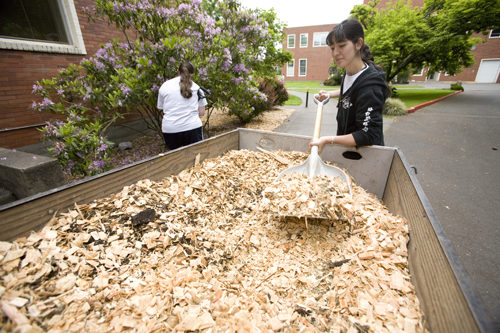- The grounds crew has decrease their use of chemical pesticides from 58 chemicals to only one chemical pesticide (roundup; rarely used). They use Oregon Tilth Accredited organic and natural “pesticides” including vinegar.
- Organic fertilizers, created specifically to fulfill the different soil needs around campus, are also used. Willamette Organics tests the soil all around campus to determine what the soil lacks, and then makes a blend, often including feather meal and chicken manure. Treating the health of the soil rather just the health of grass and plants decreases the soil's dependency on additives and brings it to a healthy balance.
- Leaving grass clippings on the lawns after they are mowed adds nitrogen back to the soil as part of a natural process, further decreasing the need to use any chemicals or even natural and organic additives to the soil.
- The grounds crew employees attend workshops and classes by organic gardening authorities, including OMRI (Organic Materials Review Institute) and NOFA (Northeast Organic Farming Association), to learn new methods of organic gardening and share their ideas with others.
- Hand-weeding and other methods of weed removal replace chemical use in eliminating weeds around campus. The crew also uses cardboard and wood chips to cover and kill weeds naturally, along with using the flame thrower when necessary.
- Their sprinkler system uses much less water than other systems because the grounds crew utilizes a drip system that allows a higher percentage of the moisture to be held in the soil (rather than just running off). The crew has identified lawns around campus that don’t need much water and lets many of their lawns go dormant during the summer time. Their healthy soil holds water better and can sustain healthier plants with less water.
- The crew has supported a shift in the community’s attitude toward weeds: they promote a tolerance of diversity, allowing clover and dandelions to grow in many of the lawns (which are good for the honeybees around campus) and don’t worry about the presence of plants, often considered weeds by others, in places where they weren’t planted. They utilize perennial planting, understanding that people will notice these plants instead of focusing on weeds.
- Using native species decreases the need for chemicals and decreases water use. Planting drought tolerant species also decreases the amount of water used on campus.
- Planting native species and promoting plant diversity on campus attracts beneficial insects, including pollinators and natural predators of pests, decreasing the need for chemical pesticides.
- Planting plants around campus that attract wildlife and hanging birdhouses, especially in the garden, creates a natural habitat for many of the animal species that would normally have had to relocate and find a new habitat. This also creates an environment that is more enjoyable for visitors and members of the university community.


